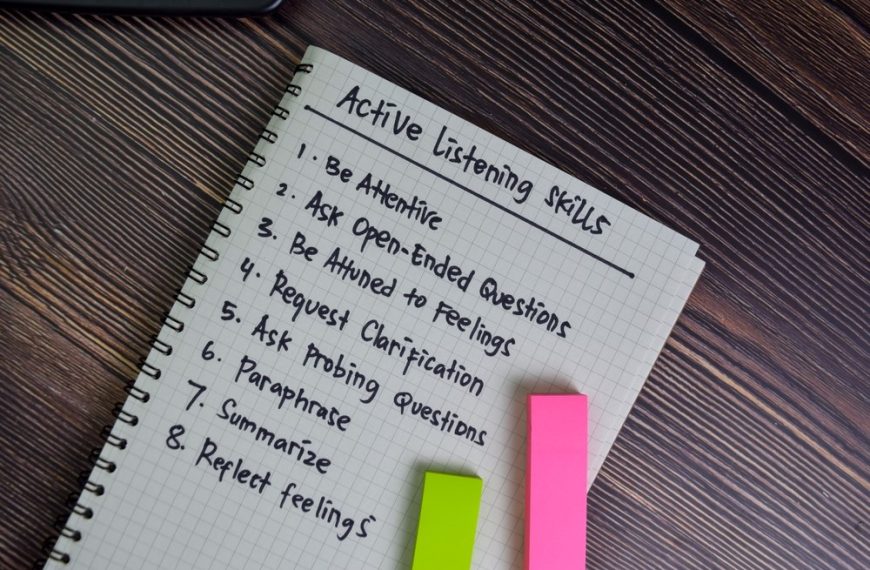Active listening strategies
Listening means giving full attention to the words or sounds that you hear. When someone is talking to you, listening also means understanding and interpreting correctly what the other person is saying. If we are to function effectively and successfully in society, this is a necessary skill for us to develop.
Understanding Active Listening
There Are Two Types Of Listening Skills: Passive Listening And Active Listening.
Passive Listening
This type of listening involves only hearing a sound or hearing the speaker’s words without trying to follow or understand what they are saying. Passive listeners do not retain any information from what was said or heard. An example of this can be seen when birds chirp on trees as people go about their daily routine work; also, music plays in the background of restaurants while people are taking meals, among other things.
Active Listening
Here, one pays attention wholly to the speaker and tries to follow through with what he/she is trying to put across. Verbal and non-verbal cues serve as acknowledgments for words spoken by a speaker during an active listening process; some examples include participating in conversation, asking/answering questions (verbal cues), and smiling/nodding body posture (non-verbal cues). Additionally, through this kind of listening, the listener can paraphrase back in his/her own words just exactly what was said by the speaker.
Importance & Benefits Of Active Listening
Active Listening helps foster better understanding since it ensures comprehension too. Quick grasping leads to equally fast learning hence kids who show activeness in class shall become good communicators who can answer questions easily and solve problems quickly too.
The Benefits Of Being An Active Listener Are:
1. Fewer Misunderstandings
These occur less frequently among active listeners who engage speakers in a conversation, which helps them clarify all doubts, leading to fewer misunderstandings.
2. Faster Work Output
For active listeners, before commencing any work, make sure that they understand the task correctly and know what is expected of them to complete it faster than less competent peers.
3. Improved Resourcefulness
Being clear about expectations makes active listeners better communicators since this enables them to tap into their resources for improved output.
4. More Self-Reliance
Once active listeners get what was said right or understand it well enough, there is no need to seek further clarifications from anybody else, thus becoming self-reliant themselves.
5. Enhanced Productivity
Good active listening skills coupled with exact knowledge of the current job at hand reduce mistakes during execution, thereby increasing productivity levels.
Constructing Confidence and an Emotional Bond Picture, if you will, your little one comes up to you with tears in their eyes and describes an incident they had with a friend while playing. You make them feel safe by using active listening skills, comforting words, and validating their feelings. Such steps create a space for the child where he or she feels that they are really understood.
6. Improved Language
Use and Better Thinking Active listening is also helpful because it helps kids develop their language abilities and think better. When we actively listen to our children, we give them room to express themselves – this not only expands their vocabulary but also stimulates cognitive growth as they learn how to explain what happened or how they feel about something.
7. Higher Problem-Solving Skills
Through active listening our kids start thinking critically and become better at solving problems on their own. By taking part in conversational activities which require participation from both sides equally (e.g., asking open-ended questions), we build self-confidence in them thus laying the foundation for future decision-making capacities.
Understanding Active Listening among Toddlers
So much of understanding active listening is about hearing the other person out. It’s trying your best to know what’s going through their mind before responding with empathy or any other kind of useful response if necessary. If you imagine your toddler runs up to you waving a drawing they made at school, but instead of looking at it for half a second then saying, “That’s nice” – which I’m sure is often the case -active-listening would involve taking time appreciating details; like asking questions such as ‘tell me more about those colours?”
The Skill of Active Listening with Toddlers: The Three R’s
- Repeat: Repeating back what has been said indicates attentiveness; this can be done more effectively either by summing up or reiterating part of what was said, thereby pushing the other person to continue talking, knowing that there is someone who listens.
- Reflect: Reflecting on what has been heard keeps the conversation flowing while providing some insight into the other person’s experiences. For instance, a question like “So you were upset by the situation but still love working there?” helps us go deeper into it and offer more help.
- Respond: Don’t feel like we have to sit back quietly all the time, either. Responding shows that we care about what they’re telling us; it lets them know that their issue matters to us, too. So if someone says “That must’ve been awful!” or “I’m sorry about your terrible day,” – those are clear sympathetic responses, but silence can also work sometimes; just focus on nonverbal feedback instead.
Listening Skills Activities
1. Create a Distraction-Free Space
Find a quiet corner where you can talk to your child without being interrupted. Turn off the TV, put away electronic devices such as phones and tablets, and any other background noise that could distract their attention from listening carefully to what they are saying.
2. Get Down
Physically Position yourself at eye level with your kid when talking/ listening – it creates an atmosphere of equality and encourages better involvement since he/she sees that you are fully present in this conversation together.
3. Using Non-Verbal Hints
Nodding, making faces, and keeping eye contact are powerful signals of active listening because through these actions children recognize that someone is actually paying attention to them keenly.
4. Encourage Expression through Play
Remembering that active listening involves creating opportunities for children to freely express themselves; engage them in interactive games. During pretend play or storytelling sessions, let a kid know that he/she is permitted to speak out whatever comes into their mind without fear of being judged or ignored.
5. Patience and silence should be observed
Never interrupt or finish the sentences of your toddlers. Give them enough time to think and respond at their own pace. Be comfortable with silence as it helps them organise their thoughts and promotes more meaningful conversations.
6. Use simple and clear language
Use words that are appropriate for their age and understanding when talking to toddlers. Make your statements easy to follow by avoiding complex terms or abstract ideas that may confuse them.
7. Utilise visual aids
Visual aids are helpful in communicating with toddlers better. When having conversations, use pictures, drawings or even physical objects so that they can see what you mean.
8. Visual and tactile cues
Toddlers often respond well to cues like gestures or touch. You can use hand movements, gentle pats or physical signs whenever you want them to understand something.
Conclusion
Active listening is an important skill which forms a basis for effective communication as well as working together with children. We build trust, emotional connection and cognitive growth among our little ones through creating an environment that supports active listening. Therefore it is good to have patience, non-verbal communication skills and involve children in activities that boost their listening abilities too.
At EuroKids, we recognise the value of active listening in early childhood development. Our curriculum is intended to create an interesting and loving atmosphere in which children can pursue their interests, improve their communication skills, and lay solid foundations for lifetime learning. To learn more about us and our carefully designed curriculum, visit our website or the closest EuroKids centre.
















